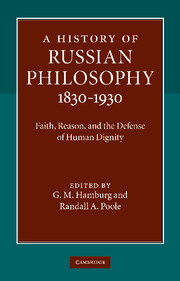Book contents
- Frontmatter
- Contents
- List of contributors
- Acknowledgments
- Introduction: The humanist tradition in Russian philosophy
- I The Nineteenth Century
- II Russian Metaphysical Idealism in Defense of Human Dignity
- III Humanity and Divinity in Russian Religious Philosophy after Solov′ëv
- IV Freedom and Human Perfectibility in the Silver Age
- V Russian Philosophy in Revolution and Exile
- 15 Russian Marxism
- 16 Adventures in dialectic and intuition: Shpet, Il′in, Losev
- 17 Nikolai Berdiaev and the philosophical tasks of the emigration
- 18 Eurasianism: affirming the person in an “era of faith”
- Afterword: On persons as open-ended ends-in-themselves (the view from two novelists and two critics)
- Bibliography
- Index
15 - Russian Marxism
Published online by Cambridge University Press: 05 June 2012
- Frontmatter
- Contents
- List of contributors
- Acknowledgments
- Introduction: The humanist tradition in Russian philosophy
- I The Nineteenth Century
- II Russian Metaphysical Idealism in Defense of Human Dignity
- III Humanity and Divinity in Russian Religious Philosophy after Solov′ëv
- IV Freedom and Human Perfectibility in the Silver Age
- V Russian Philosophy in Revolution and Exile
- 15 Russian Marxism
- 16 Adventures in dialectic and intuition: Shpet, Il′in, Losev
- 17 Nikolai Berdiaev and the philosophical tasks of the emigration
- 18 Eurasianism: affirming the person in an “era of faith”
- Afterword: On persons as open-ended ends-in-themselves (the view from two novelists and two critics)
- Bibliography
- Index
Summary
The history of Russian Marxism is inseparable from ideas of human freedom and dignity. It combined the real desire to alleviate the misery and degradation of the laboring masses with the Marxian dream of the total realization of collective human potential, envisioning a totally regenerated human species of the future. As a whole it utterly failed to appreciate that individual human beings are absolute values in themselves who ought never to be sacrificed as means for ostensibly higher (and remote) purposes. In this, Russian Marxism proved deeply inimical to its own humanist ideals.
MARXISM IN PRE-REVOLUTIONARY RUSSIA
The emergence of Russian Marxism was preceded by the reception of Marx's and Engels's ideas in the populist movement. The Russian populists saw Marxism as the last word in the socialist theory of capitalism, that is, of the “bourgeois stage” of social evolution. Unlike earlier, “utopian” forms of socialism, Marxism assumed the necessity of capitalist development but had no illusions about its painful consequences for the broad masses of the population. The necessity of capitalism was grounded in the general Marxist theory of the “objective laws of history,” independent of human will and consciousness. The dire consequences of capitalist development for the welfare of the people were part of its historical task, which consisted in the expropriation of direct producers (peasants and artisans) and their transformation into property-less proletarians in order to pave the way for the concentration of capital, which was seen as a necessary condition of socialism.
- Type
- Chapter
- Information
- A History of Russian Philosophy 1830–1930Faith, Reason, and the Defense of Human Dignity, pp. 305 - 325Publisher: Cambridge University PressPrint publication year: 2010
- 2
- Cited by

